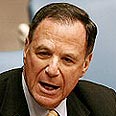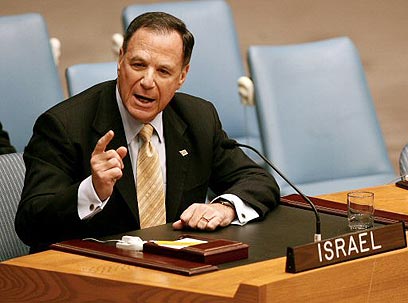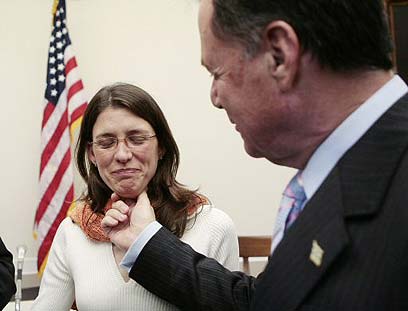
Gillerman. Israel's next prime minister?
צילום: רויטרס
Gillerman: We are better than most of world
After five and a half years at top of global diplomacy, Israeli ambassador bids farewell to UN with his head held high
WASHINGTON – He was a diplomatic rookie who had served as president of the Federation of Israeli Chambers of Commerce, when then-Foreign Minister Shimon Peres decided to bet on him and send him to represent Israel at the United Nations in January 2003.
Armed with good knowledge of English and an understanding of the media rules of the game, Dan Gillerman landed in New York as a great mystery. Next week he will complete five and a half years as Israel's envoy to the UN, pursued by the American media until the very last moment.
Gillerman is considered "a man of people", of small gestures and laughs. He turned on his personal charm on quite a few ambassadors, including those representing countries which have no diplomatic relations with Israel – and even envoys of hostile countries. His first target was Pakistan's UN Ambassador Munir Akram – a relationship which eventually led to a public foreign ministers' meeting.
"The Pakistani ambassador was very close to (Pakistani President Pervez) Musharraf," he recalls in a farewell Ynet interview. "Our first meetings were at shady bars and hidden hotel rooms. He was really afraid that we would be discovered. Overtime, the friendship burst out. He was at our house and we visited their house, we went out together. It turned into a real friendship.
When Benazir Bhutto was considered Pakistan's next prime minister, a month before her assassination, she asked to meet with Gillerman.
"The meeting last three hours, during which we examined the Israel-Pakistan relations in a very interesting manner," he says.
He still refuses to talk about various meetings and discussions he held in the corridors of global diplomacy. He agrees to speak about the relationships he developed with his colleagues from Oman, Morocco and Qatar.
His relations with Omani Ambassador Fouad Mubarak Al-Hinai led to a foreign ministers' meeting at his house two years ago, during the UN General Assembly. He even tried to contact the Syrian ambassador who, according to reports, was chased by the Israeli ambassador to the bathroom.
Gillerman denies the occurrence of "bathroom diplomacy", but admits that he tried to get closer to the Syrian envoy. It all began when an Israeli reporter approached the ambassador, Bashar Jafari, introduced himself as a Romanian reporter and began asking questions.
"I felt that it was my duty, due to the UN ethics, to draw the Syrian ambassador's attention to the deceit. Although it began innocently and spontaneously, I thought this may be an opportunity to start a connection.
"He knows exactly who I am," says Gillerman. "Our conversation was short and civil. He thanked me for the gesture. I am not against 'bathroom diplomacy', but it was in front of the cameras. We then entered the room adjacent to the Security Council. We had a short talk, which I thought might lead to something, to a dialogue. It didn’t happen.
"Ambassadors like the Syrian, the Iranian and the Libyan don’t say 'hello' to me, not because they don’t want to – they're afraid. I said hello to everyone. I didn’t go out of my way to have them shake my hand. Those three are clearly afraid, and that's why nothing happened."

Gillerman also recalls an interesting experience with the Iranian ambassador. "As deputy president of the assembly, I was a member of the General Committee, and there, due to alphabetical order, the Iranian found himself sitting next to me. There he at least nodded, but nothing else.
"It was the previous Iranian ambassador, Javad Zarif, a relatively moderate person, whose body language indicated that he was 'dying' to do something. If he could, he would launch a dialogue."
Clashing on CNN
In his work opposite the foreign press, Gillerman encountered the indifference of television networks refusing to interview Israeli representatives on the rockets fired into Sderot.
"There are producers who tell us cynically that if there are less than 20 dead, there is no use in calling them," he says.
In interviews he tried to keep cool and has excellent knowledge of the issues he is dealing with, but during the Second Lebanon War he clashed with interviewers.
"I was sitting in front of a CNN reporter who accused us of killing hundreds of Lebanese, including dozens of children, while we only lost 54 soldiers. I told her, 'You really make me feel ashamed and apologize to you for not being able to provide you with more dramatic numbers.' It was live, and she was pretty shocked.
"But this is reality. You do your utmost to try and explain the difference between people aiming at women, children and babies in order to kill them because they are Jews and Israelis, and on the other hand – a democratic state trying to defend its citizens."
During the discussions at the UN, the ambassador found himself more than once deviating from the rules of diplomacy, particularly in light of what he identified as hypocrite homilies. This is what happened, for example, with the French ambassador, whose career was even damaged following the incident.
"Paris supported a condemnation of Israel for its military response to the Qassam fire," Gillerman recalls. "I asked what would they do if rockets were fired from the other side of the border towards Lyons – would they respond with flowers? I accused France that by supporting the resolution it was in fact laying flowers on the graves of the next victims.
"It turned out that Ambassador (Jean-Marc) de La Sablière was essentially expressing his own opinions, against his Foreign Ministry's instructions. The fact that I attacked his country at the UN Assembly reached the first pages of Le Monde and Le Figaro, including an interview with me."
Despite the great frustration felt by the Israeli representatives at the UN corridors, Gillerman says he walked about the place with a straight back and his head held high.
"I know I'm representing a country which is much better than most of the UN members. A country which contributed to the world, not only to itself, more than most of the others. This is why it was important for us to bring to the UN Israeli knowledge in areas like desertification and agriculture, rather than just being a delegation dealing only with the conflict issue."
Headed to business
His addresses at the Security Council during the Second Lebanon War were among the best the organization has seen in recent years, and there are those who even noted that he caused the institution to awake from its boredom.
Former US Ambassador to the UN John Bolton wrote in his book "Surrender is not an Option" that the Tanzanian envoy had whispered to him during one of the discussions that he couldn't understand why the Arabs kept on asking for urgent meetings against Israel – and giving the stage to Gillerman.

During his performances in Manhattan, Gillerman often exhibited his acting abilities, the kind one usually sees on Broadway. Israeli talkbackers have already crowned him the next prime minister. Female talkbackers have even asked him to have a child with them.
"Having a grandson is also a possibility," 64-year-old Gillerman jokes, and immediately becomes serious. "I'm very flattered and I'm happy to see such support, which is pretty rare in our country."
But Dan Gillerman knows more than anyone else what he is and what he's not. He won't run for Tel Aviv mayor in order to evacuate residents' garbage. He also won't waste his time at weddings and bar mitzvahs of party members in order to somehow receive a minor position in a temporary government. Dan Gillerman is headed back to business.
"I've decided not to go to politics, not because I think it's not important," he clarifies. "Destinies are determined in politics. Unfortunately, however, the experience over the past few years, with good people who came from the outside thinking they could contribute, was not a ravishing experience.
"At this stage I've decided to go to business because that is the field I come from," the outgoing ambassador uses his words carefully, without closing the door on any future options.










